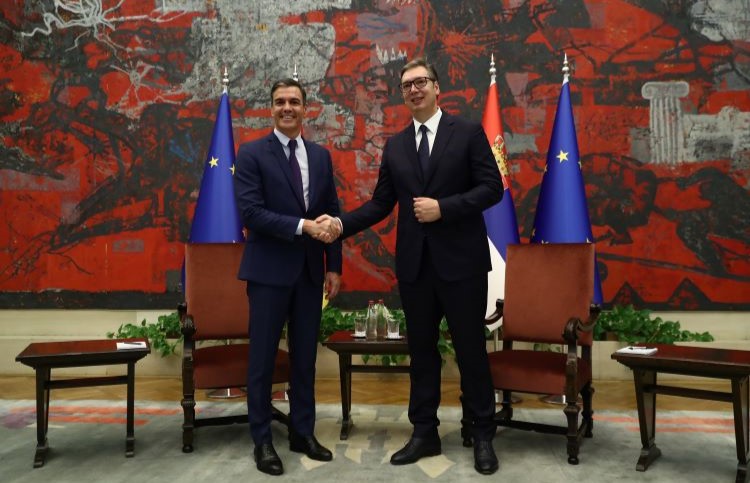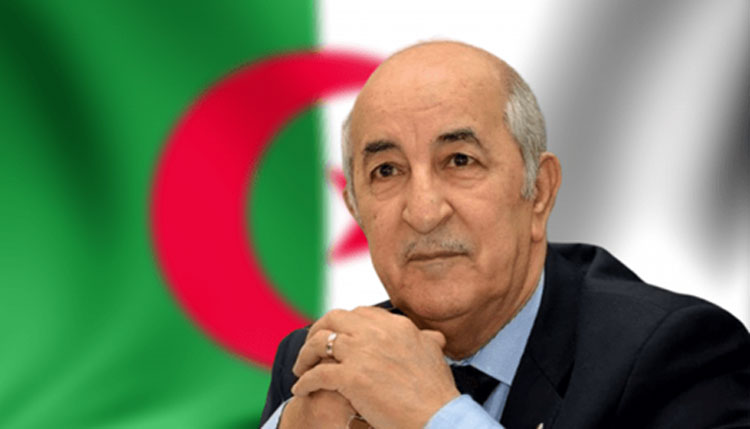Eduardo González
The President of the Government, Pedro Sánchez, reiterated yesterday in Belgrade his support for the accession of Serbia and the Western Balkans as a whole to the European Union and assured that Spain “has been and will be at Serbia’s side” in relation to Kosovo.
“The war in Ukraine has opened a reflection on what Europe is and who we Europeans are”, declared Sánchez during a joint press conference (without questions) with the President of Serbia, Aleksandar Vučić, on the first stage of the tour being carried out by the Chief Executive through the Western Balkans, which includes, in addition to Belgrade, Sarajevo and Mostar (Bosnia and Herzegovina), Podgorica (Montenegro), Skopje (North Macedonia) and Tirana (Albania). This is the first official visit of a Spanish Prime Minister to Belgrade.
“The EU has opened the debate on enlargement to different countries of Eastern Europe, and of course of the Western Balkans” and, therefore, “we must continue to support the accession processes, because you are part of Europe”, he continued. “If the Balkan countries, including Serbia, which has been a candidate since 2012, continue, as they are doing, with their determination in the reforms, do not doubt that Spain will always be at your side, that you will have our support to become, as soon as possible and based on the principle of own merits, full members of the EU,” he added.
According to Sánchez, “Serbia and Spain are friendly countries” which are “united by many things”, but what unites them most is “the conviction of the need to ensure respect for international law and the sovereign integrity of States, the territorial integrity of States”. “That is why we support Serbia in what has to do with Kosovo,” he said. “Spain has been and will be at Serbia’s side in the defense of these principles and will always appeal to dialogue between the parties to resolve differences, but, obviously, the territorial integrity of nations must be respected and international law must be respected,” he warned.
Kosovo unilaterally proclaimed its independence from Serbia on February 17, 2008, but the new state has not been recognized by Serbia or by many countries, including Spain (as well as Greece, Cyprus, Slovakia and Romania, within the EU). In 2011, Serbia’s leaders began negotiations for the normalization of relations with Kosovo, thanks to mediation from Brussels and in the context of Serbian aspirations to join the EU. However, the dialogue was completely blocked between 2018 and 2019.
Serbia is aware that the lack of an agreement with Kosovo harms its aspirations to join the European Union and is therefore trying to find a formula acceptable to it. For its part, Kosovo knows that without an agreement with Serbia it will not be able to approach the EU or join the UN. For these reasons, the two parties resumed dialogue in Brussels in July 2020. Last June 24, the European Council urged “tangible progress” between Belgrade and Pristina “to facilitate the normalization of relations between Serbia and Kosovo”.
For his part, Aleksandar Vučić (who paid an official visit to Spain last February 23, just a day before the Russian invasion of Ukraine) stated at the same press conference that “Spain is a sincere friend of Serbia and is always lending its support to the Serbian path to the EU, and this is something we can feel at all meetings, summits and conferences”. He also expressed his gratitude to Spain for its support “for the respect of Serbia’s territorial integrity within international law.” “Spain is giving us great support in the talks between Belgrade and Pristina,” he stressed.
Invitation to the King and business summit
The Serbian leader also took advantage of his speech to send greetings to King Philip VI and invite him to visit Serbia. “I would love to see him once again in Serbia, as he already was when he was a prince in 2004, when he inaugurated the Cervantes Institute,” he said. “For me it would be a pleasure to be your host once again, we are a small country but your visit would represent something big,” he concluded.
On the other hand, Pedro Sánchez expressed his wish for Spain and Serbia to increase their economic and trade relations so that they are “on a par” with the “excellent political relations”. “There are many Spanish companies that are established in Serbia, and many that are going to come and contribute to the economic growth and development of Serbia and, to facilitate this greater presence of Spanish companies, we will hold a summit between Spanish and Serbian companies in Belgrade next fall, and we are working both governments to soon sign a bilateral agreement on economic matters that will allow us to develop the full potential of economic and trade relations between the two countries,” he announced.







